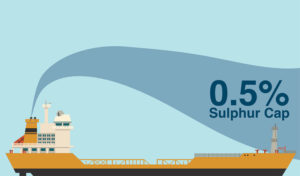 The Philippines having been a signatory to the International Maritime Organization’s (IMO) directive on October 2017 under the terms of the IMO’s MARPOL Annex VI Regulation, is directed to go ahead with a global sulfur cap of 0.5% on marine fuels starting from 01 January 2020. The Convention on IMO conferred upon the function of Marine Environment Protection Committee (MEPC) for the prevention and control of marine pollution from ships. MEPC adopted in its resolution (RESOLUTION MEPC.320 74) a revised MARPOL Annex VI which significantly strengthens the emission limits for sulfur oxide (SOx).
The Philippines having been a signatory to the International Maritime Organization’s (IMO) directive on October 2017 under the terms of the IMO’s MARPOL Annex VI Regulation, is directed to go ahead with a global sulfur cap of 0.5% on marine fuels starting from 01 January 2020. The Convention on IMO conferred upon the function of Marine Environment Protection Committee (MEPC) for the prevention and control of marine pollution from ships. MEPC adopted in its resolution (RESOLUTION MEPC.320 74) a revised MARPOL Annex VI which significantly strengthens the emission limits for sulfur oxide (SOx).
The Department of Foreign Affairs (DFA) provides representation of the Philippine Government in the International Maritime Organization and the Maritime Industry Administration (MARINA) serves as implementing agency of MARPOL Annex VI.
In June 2018, PIP generally sought the government’s plan on its implementation, enforcement and monitoring. The position and recommendation cover the readiness of the shipping industry (both international and local) to comply with MARPOL Annex VI, country’s assessment of the supply availability of readily-compliant fuel, and engagement of relevant stakeholders (i.e. shipping industry, oil suppliers and government enforcement agencies). The stakeholder engagement is crucial to assess the potential impacts of this international regulation not only to marine fuels but also on the cost of impact on freight for all sea-borne imports and exports of petroleum products.
The PIP expresses its concern that with the increasing trend in crude and finished product’s price in the world market, compliance to MARPOL Annex VI strict regulation on ship’s engine emissions addressed either by installation of the prohibitively priced emission control devices (scrubbers) or use of the high priced 0.5% sulfur bunker fuel, the regulation will further put the domestic shipping industry in an uncompetitive stance via-a-vis other comparative shipping industry in the region as its direct impact to the industry.
The PIP generally expresses the potential impacts of this international maritime regulation to the downstream oil and shipping industries, and specifically the freight costs for all sea-borne imports and exports of crude and petroleum products. Significant price increases in low sulfur fuel oil shall impact on shipping costs which eventually will be reflected in petroleum product prices which in turn shall impact on prices of commodities which will induce higher headline inflation. The shipping association estimates of a 2-4% increase in freight for every P1/increase in fuel cost, is considered to be a conservative estimate.
In view of the foregoing, the PIP communicated to DFA through MARINA the following recommendations:
- The Philippine Government has the exclusive decision whether this regulation will move forward in 2020 or may consider possible deferment subject to due consultation with various stakeholders without prejudice to the country’s commitment or global obligations on the matter;
- To better guide the Government in making its decision, the industry recommends to the Philippine Government to conduct study to: (i) assess the sources and nature of air pollutants in local/domestic waterways and (ii) assess the oil industry readiness to supply domestic demand by 2020 and the shipping industry’s ability to utilize low sulfur fuel readily;
- In relation to the extension/adoption of the 0.5% sulfur cap to inland/local marine fuels for domestic vessel dedicated to local/territorial water shipping, the downstream oil and shipping industries request for a thorough review of this local application amongst the different local stakeholders in the country;
- Revisit implementation best practices/models of other countries specifically those adopting the Emission Control Areas (ECA) designated under MARPOL Annex VI to provide a global perspective of the implementation of this IMO regulation.
MARINA in coordination with the PCG- Maritime and Ocean Affairs Office (PCG-MOAO) organized the country’s participation in the 75th Session of the Marine Environment Protection Committee (MEPC75) to be held from March 30 to April 3, 2020 at the IMO Headquarters in London, United Kingdom. However, this international event might be pushed forward considering the enhanced community quarantine declaration amidst the covid-19 crisis in the world. MEPC is the international maritime committee regulating, monitoring and evaluating relevant policy issuance and country performance for marine pollution agenda as provided in Annex VI of IMO 2020.
The PIP together with its six member-companies acknowledge the IMO MARPOL Annex VI provision of low sulfur content for international marine fuels effective January 2020 and fully support its compliance subject to the Implementing Rules and Regulations to be developed by the concerned state regulator (MARINA).